TRIBUTE TO OUR LANGUAGE MARTYRS
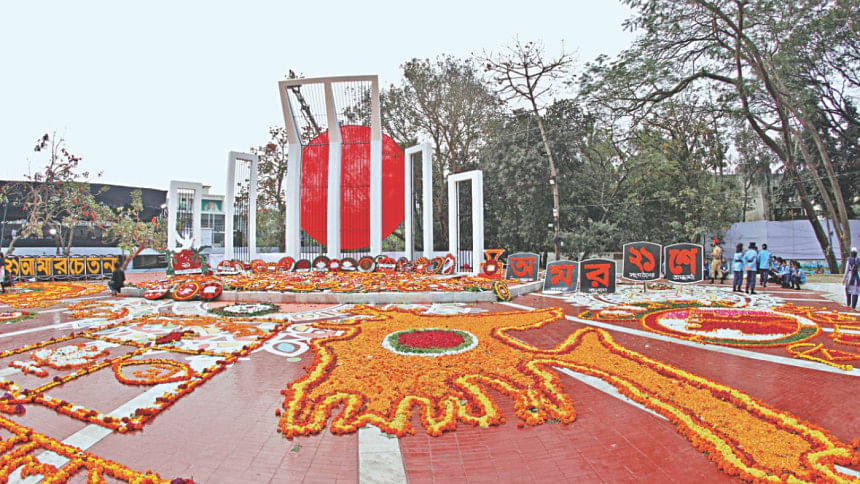
As blood oozed from the bodies of Rafique, Jabbar, Barkat, Salaam and countless others, the Language Movement activists witnessed the brutality on their fellow brothers on February 21, 1952.
This year, we observe the 66th anniversary of our Language Martyrs' Day, now also recognized as International Mother Language Day.
The Fuller road/Nilkhet area very near to the Dhaka University premises always bore a serene ambience. The sprouting greenery, the Devdaru trees the Jarul blossoms and the campus thriving with young and energetic students kept the area abuzz the year round.
But deep down, the sentiment was very much different from the apparent calm surrounding. The suffocation at not being able to speak freely in one's mother tongue was like a constant whip on strained spirits. There was pent-up fury waiting to be unleashed, Abdul Matin also known as 'Bhasha Matin', said years ago at a commemorative programme I attended.
The root of this problem was the decision taken in Karachi at the Education Commission in 1947 - a world away from Dhaka - yet it affected the lives and custom of every Bengali citizen. In 1948 at the Suhruwardy Uddyan and Curzon Hall, Md Ali Jinnah declared the infamous statement that Urdu would be the only state language of the newly-independent Pakistan. Abdul Matin, along with a few spirited others immediately opposed the statement amidst the huge gathering at the Curzon Hall.
The message was resoundingly clear. How could Urdu be the national language when there were three times as many people whose mother tongue was Bangla?
At the gathering, Abdul Matin spoke of the dominance of the English language in the sub-continent. From the times of colonialism to the partition of India, people had grown used to its prevalence from post cards to money order forms, which were still printed in English. The concerned authority paid no heed to change it; but by 1952 the time had surely come to change.
A good number of student leaders took up this charge head-on. They felt it necessary to make people aware of the impending trap of losing touch with one's mother tongue. Secret meetings gave way to bigger organisations. Gradually, the Bishwabiddalaya Sangram Committee (University Movement Committee) and the Shorbo Dolio Kendrio Rastrabhasha Sangram Parishad (All-Party Central Language Movement Committee) was organised. Students met under the guidance of the student leaders. Meetings turned into crowds, crowds into massive gatherings.
As time went by, to voice their demands and create awareness amongst the people, students assembled at the university premises on February 21, 1952. Prominent intellectuals, journalists, teachers, students from all walks of life declared their unity with the movement. In an attempt to break the much-hated section 144, the students rallied from the Dhaka University building towards the Medical College premises.
The carnage that followed remains one of the darkest chapters in the history of brutality on the innocent. In fact there are very few records of such a revolt being staged for ones' language.
Gaziul Huque, in a choked voice had said that the recognition and right of mother language was achieved after years of struggle, but the dream still remained unfulfilled. He called upon the young generation to carry on the dreams of the martyrs of the Language Movement.
Victory and defeat are co-related. While people of other countries are aggressive and have great appreciation and love for their mother tongue, we as a nation still thrive on artificiality. It's like “snatching defeat from the jaws of victory” rather than vice versa. To develop as a race, we need to develop self-esteem first. A nation thrives only when people learn to appreciate their roots and take pride in their history, he had reiterated.
The martyrs were the activists who were re-shaping our culture, rekindling the sparks that had ebbed down after two centuries of colonial rule. They had inculcated a sense of pride in our mother tongue. Ekushey is now recognised as the International Mother Language Day. And it was a small wonder that we were the lucky few to witness history once again… in the words of people who had lived through the era: an era that pitted innocence against brutality. An era that undeniably re-directed our destiny through countless lives lost and scarred.
Can the supreme sacrifice of our martyrs be ever forgotten?

 For all latest news, follow The Daily Star's Google News channel.
For all latest news, follow The Daily Star's Google News channel. 

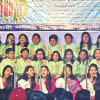
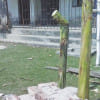
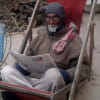
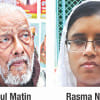


Comments